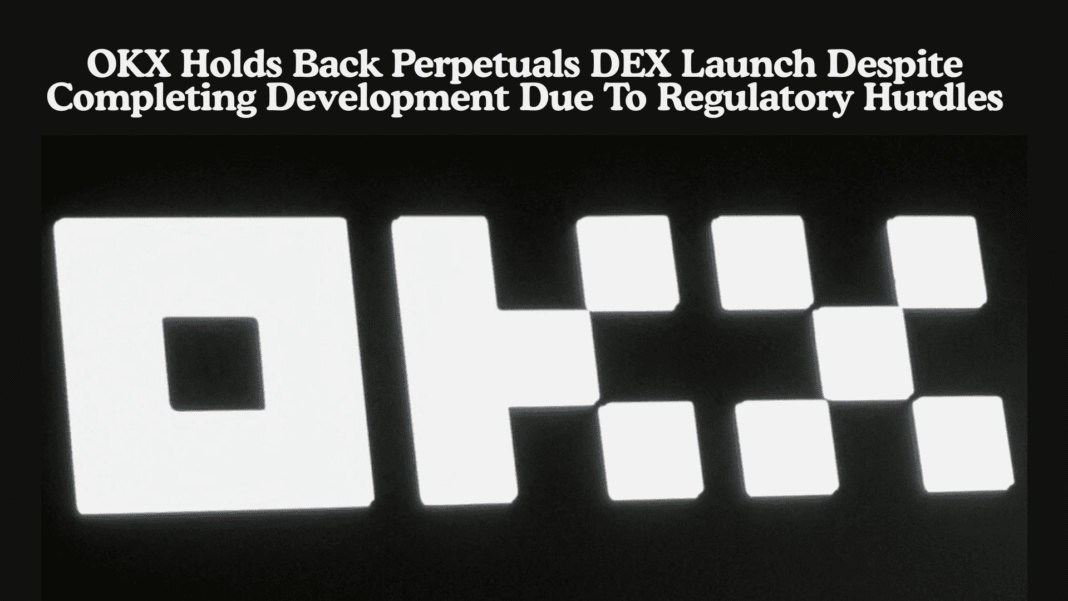In a recent development, the crypto exchange OKX has announced that its Web3 division had finished building a decentralized perpetual trading platform in 2023.
However, it did not want to launch the platform out of concern over regulation.
The trading platform was created to compete in the DeFi derivatives space with decentralized perpetual exchanges, such as Hyperliquid and Aster.
Star Xu, the founder and CEO of OKX, stated in a X post that they had been testing the platform for some time.
However, the risk of regulatory enforcement outweighed the potential benefits of going live with the product.
Regulatory Enforcement Concerns Shape OKX’s Decision
The reason that OKX is being conservative has to do with increased regulatory enforcement in the United States.
The CFTC had earlier pursued Opyn and ZeroEx for similar violations relating to leveraged and margined retail transactions.
Star Xu referenced the CFTC action against Deridex in September 2023 for illegally offering digital asset derivatives without proper registration.
Xu emphasized how these cases have altered the risk environment for perpetual platforms, making it increasingly risky for responsible, established players like OKX to go live without clearer guidance.
Also Read: Sui DEX Momentum Completes New Funding Round With a Valuation of $100 Million Led by OKX Ventures
Shifting U.S. Regulatory Landscape
Although it’s difficult to predict the future, some shifts are emerging regarding U.S. regulations.
The election of the crypto-friendly President Donald Trump back in January has already sparked some movement among policymakers pertaining to more inclusive and responsible regulatory oversight toward digital assets.
Most recently, the CFTC welcomed new crypto leaders into the Digital Asset Markets Subcommittee as part of its Global Markets Advisory Committee, suggesting increased engagement with the government.
Moreover, the White House issued a report in July stating that the CFTC and SEC should share roles and responsibilities, with the CFTC possibly even regulating spot crypto markets.
This change could provide substantively needed clarity for DeFi projects.
Also Read: Coinbase Launches DEX Trading To Give Users Instant Access To Millions Of Onchain Assets
Rising Competition in the DEX Perpetuals Market
The postponement of OKX’s decentralized perpetuals platform comes as several new players are entering the space and increasing the competitive landscape.
On August 30th, Hyperliquid attracted about 80% of the perpetuals DEX market share, with more than $200 billion traded, while its governance token, $HYPE, on its own was estimated to generate $1.13 billion in annual revenue, according to UnoCrypto.
Weeks later, we reported that Aster DEX token $ASTER rose by 400% after Binance co-founder CZ shared public support and YZi Labs offered backing, and $HYPE also reached a new all-time high during the same time.
All of these events signal a tremendous appetite for decentralized derivatives and the associated profits for successful projects.
New Entrants Intensify Market Rivalry
In addition to the competitive mix, Tron founder Justin Sun announced his new platform Sunperp in September, which only adds fuel to the tension between leading decentralized perpetuals platforms.
Sunperp was built on the Tron blockchain and is positioning itself as a high-performance crypto derivative decentralized trading platform that can provide deep liquidity and instant order execution with little slippage on large trades, UnoCrypto reported.
Sunperp’s launch also indicates that prominent players back in the sector are taking a stronger interest in competing among new decentralized perpetual DEXs.
For OKX, the decision to postpone its new perpetuals DEX means it will give up some early market share to competitors, but the potential for regulatory caution to benefit the exchange’s reputation and positioning down the line is still a reasonable justification for its choice.


